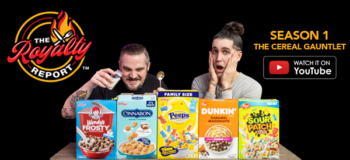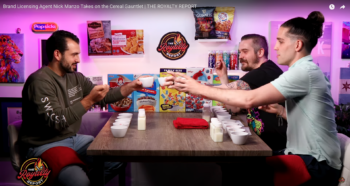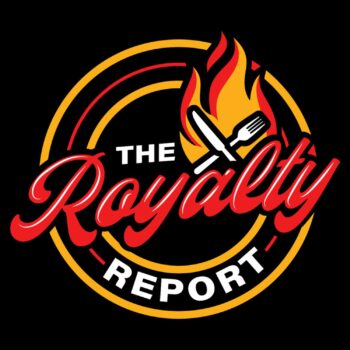By Gary Symons
TLL Editor in Chief
It might be due to my own history as a broadcast journalist, but I’ve quickly become a fan of a new podcast, The Royalty Report, by licensing exec Peter Cross of Broad Street Licensing Group and marketing guru Trevor Graham.
The premise is a bit like The Hot Ones, the popular interview podcast in which celebrities try to form halfway intelligent sentences, while gasping through a succession of progressively hotter chicken wings.
But The Royalty Report combines a sense of fun and occasional mischief – like when they surprise guests with the burning hot breakfast cereal CinnaFUEGO – with informative interviews that cover all types of licensing, but also dive into the lives and personalities of their guests.
The show is brand new, and is still in the early stages of picking up a fan base, but Cross says the feedback for The Royalty Report has been extremely positive.
“What we’re trying to achieve is additional touchpoints for people or other brands to see who we are, as an agency,” Cross says. “Obviously there are plenty of LinkedIn posts out there, or your website can tell people what you do, but those things aren’t great at showcasing what you’re like as a person, so we decided it was time to showcase what we do and who we are. And this is the fun way to really bring that out because, you know, people don’t do business with other companies; they do business with other people.”
Already, despite the fact the show is very new, it is creating more interest in engag- ing with Their agency Broad Street Licensing Group, which Cross believes comes down to the fact that people watching the show already feel like they know them.
In a way, that is true, because many of the viewers will drop comments or ask questions on The Royalty Report’s YouTube page, creating a level of engagement Cross hasn’t seen from other types of social media.

The show is also growing, and while it’s still early days, Cross says the level of engagement and positive feedback they’re getting has him optimistic about the project’s success.
“It’s literally growing with every episode,” Cross says. “We have more and more viewers, and more and more fans. I know, of course, it’s still flying a bit under the radar right now, but I feel as long as we keep doing what we’re doing, we’re going to continue seeing more people bingeing the show.”
Cross says the idea came up during the pandemic when he saw the boom in popu- larity for podcasting at a time when many people were essentially locked up in their homes, unable to see friends, family, or in many cases, even go to work.
“Here at Broad Street we had already been brainstorming about ways we could bring more content about food and beverage licensing to people in our industry, but it wasn’t until COVID hit and I saw how podcasting had really soared in popularity that we started to think seriously about how to get into this, and last year we actually pulled the trigger.”
Broad Street’s Royalty Report a Clever Look at Licensing

The show you see today looks slick and well rehearsed, but Cross says it was neither quick nor easy to get the program where the team was happy with it. While he’s thrilled with the reaction so far, and already seeing benefits for the licensing agency, Cross says anyone looking to start a podcast will quickly find out there’s a steep learning curve, and he advises anyone trying it to listen more to their critics than to their fans.
In the first episodes they produced, Cross and Graham were working on doing a podcast primarily about food licensing and branding, because Broad Street is one of the first and certainly the largest licens- ing agencies when it comes to food and beverage licensing. In fact, Broad Street has been recognized for many years as a Top 20 global licensing agency by License Global.
“I mean, we’ve been in food and beverage for at least 15 years, basically the first agency to really get into the food and beverage licensing sector in a really impactful way, so it just seemed to make sense to focus on that,” Cross says.
That first video saw Cross and Graham going out and shopping for a truckload of different licensed foods, and they spent hours preparing it so they could sample the products on air.
“Literally we were just trying it and talking back and forth, and there were some really good ones, but there was also some pretty terrible stuff we tasted, but y’know, you have to suffer for your art I guess,” Cross recalls. “The problem was, we ended up with over an hour of video, and we were getting a lot of feedback that an hour is just too long.”
So Cross and Graham decided to learn the hard way, by doing. They produced what Cross calls ‘fake episodes’ that were never intended to go online, and then would edit them down before they were reviewed by their coworkers at Broad Street.
“I would literally sit here with Trevor and everybody at the agency got to take a crack at us and they would be giving us some brutal feedback, like, these questions suck, or that makes no sense,” Cross says. “We would also bring in some more objective people who really have no idea whatlicensing is, and we would ask, ‘Hey, if you clicked on this episode, where are the places that you would start abandoning the video’, or ‘what parts are just not good enough’? ‘Where can we improve to make the show as fun as possible’?”
Over time, all that criticism and self reflection gave the two nascent podcasters a much better sense of what the audience wanted, and so the show changed radi- cally. The two worked more with different camera angles and better editing, and they radically shortened the show. Where the first episode rang in at an hour and 17 minutes, the most recent, an interview with IMG Licensing agent Nick Manzo, comes in at only 15 minutes.
The show now is more focused, funnier, and the theme has broadened with guests coming in to talk about all aspects of licensing, not just in the food category. For example, one episode stars Ted Larkin, the SVP of global licensing at the software company Octane5, and another dives into the new world of licensing among streaming companies with Alix Kram, the Head of Retail & Marketing/Consumer Products with Netflix.
That change also came about because of the feedback the hosts were getting from their team, who felt having the show focused on only one category of licensing would be too limiting.
“The message was, sure, Trevor and I could sit here and review stuff, but we didn’t think there was enough legs there, so we started inviting people on to the show to talk about the industry and go a little bit further,” Cross explains. “We started bringing people on to talk about parts of the industry and brand licensing. And then we started incorporating games at the end that were tailored to each guest.
“Early on we had Sharon Weissman (the US CEO of PowerStation Studios) on and we thought it’d be fun to play the Hot Ones licensed card game, ask her a bunch of questions about how she makes con- nections, and what it’s like to work in the metaverse, phygital goods, NFTs, and all these new, cutting edge technologies.”
The Weissman segment was pivotal to The Royalty Report show, because it also gave the producers the idea of creating a ‘gauntlet’ of licensed foods, an idea they quickly put into play through the rest of Season 1 with an imposing array of un- usual licensed breakfast cereals, includingWendy’s Frosty cereal, another based on Sour Patch Kids, and of course the deadly CinnaFUEGO.
“One of the big parts of the show now is that, if our guests make it through the gauntlet, they get some unscripted, uninterrupted air time at the end of the show to talk about anything they want, so they can plug into what they’re doing or what they’re about to do,” Cross says. “We had Nick Manzo (a director at IMG) on in the last episode, for example, and he decided to take the forum and talk about something more personal in his life, about gun violence and the March For Our Lives Organization that that has been doing a lot of work since the Parkland shooting.
“So, these are the kinds of things we can do with the show,” he added. “It’s not just to talk about our agency, or to promote the agency, but to engage as people all work- ing in our industry, and it’s an industry that I think is a lot of fun, and I think our show reflects that.”
Broad Street Launches ‘The Royalty Report’ Channel on YouTube
In fact, Cross says a major aspect of the show is getting away from the idea that business in the licensing sector is all about competition, because he believes it’s primarily about collaboration.
“Yes, we want to talk about the industry and we want to educate, but we want to lift everybody up together at the same time,” he says. “When people come on the show, we want to showcase their personality, what makes them successful, and what makes them tick.
“And as a result, we’ve already had two separate guests that have been on the show, and they’ve reached out to each other and they’re doing business together now,” Cross added. “That’s not one of the things we initially set out to do, but it’s now one of the extra benefits that I’m hoping to see; that this isn’t just about lifting up Broad Street, but also about lifting up the guest and the whole industry together.”
Cross and the team will, of course, be attending Licensing Expo, but this year he’s not just looking for new clients or deals, but also for more guests and fans.
If you’ve got some ideas and would like to be on the show, you can contact Peter Cross by email: peter.cross@bslg.com. To see the show, copy and paste this URL: www.youtube.com/@ theroyaltyreport
